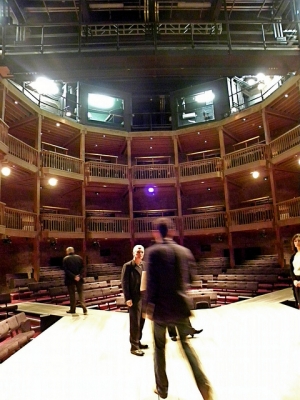The Beginnings of Londons Theatre

The audiences who flocked to the theatres in the last years of the sixteenth century were quite certain what they wanted to see and hear, and they voiced their opinions without equivocation. The difficulty was not to tempt the public to attend them, but to build the playhouses quickly enough and to supply enough new plays to satisfy-London playgoers. Before 1575-6 plays had been performed in the inn-yards of the City, but at this time ‘two public-houses for the acting and show of comedies, tragedies and histories, for recreation’, were set up. This was the beginning of London`s theatre-land, although for various reasons it was sited at first across the river to the chagrin of the City authorities, who could not control it, and to the delight of the London watermen who ferried the audiences to and fro.
Prices of admission were low; you could stand for a penny but would have to pay extra for seat, and still more for a cushion to lay upon it. A further payment entitled onlookers to sit in one of the boxes, or even to take a stool and sit upon the stage. When a play was on, a flag was flown and trumpets announced that it would soon begin, so that audiences could hurry to secure good seats. The money was collected by ‘gatherers’ and immediately put into locked boxes – hence the tem ‘box-office’. Since the plays were generally in the afternoon – being the idlest time of the day – they were performed by daylight, but if darkness fell they would be continued by the light of torches. Accidents caused either by the flimsy character of the wooden construction, or commonly from fire, were fairly frequent. As a rule, a fire was quickly detected and the audience would be able to escape without hurt, but the ‘wood and straw’ theatres were utterly destroyed.
In the lower grades actors ranked as journeymen or “hirelings” engaged and paid by the week, and the boys who played women`s parts were probably apprenticed to the leading players.
Some actors – Shakespeare is the supreme example – were playwrights as well, and adaptors of other men`s work to suit the needs of their own company.
The audiences behaved with the greatest freedom. Some ate pasties and pies, others played cards, all talked of their own affairs, and shouted their opinions. Booksellers took the chance of selling pamphlets, men filled their pipes and puffed tobacco smoke until a blue haze obscured the stage.
As early as 1564 an attempt was made to suppress the London theatres, the excuse being that the concourse of people was liable to spread plague. Again in 1573 the City of London asked for their suppression. The chief Puritan arguments were that plays were a waste of time, that they gave every opportunity for immoral behavior at the time of performance. In 1642 the Puritans, through Parliament, succeeded in imposing their restriction and the theatres were closed until the Restoration in 1660. During this break ordinary Londoners lost the habit of attending plays and thereafter audiences became more aristocratic and far less lively.
